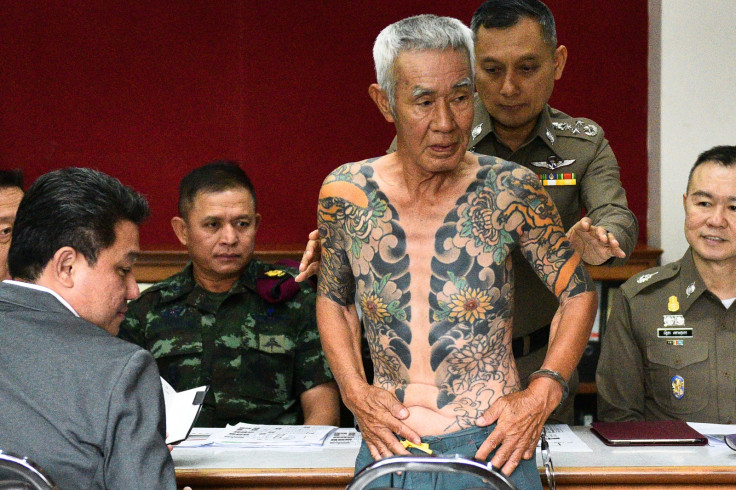Who are the yakuza? Gang boss Shigeharu Shirai arrested after tattoo photo goes viral in Japan

KEY POINTS
- Shigeharu Shirai seized after images of elaborate torso tattoo shared on Facebook.
- Yakuza organised crime syndicates date back to 17th-century Japan.
Thai police have arrested a leader of the notorious Japanese yakuza, who had been on the run for 15 years, after photos of his tattoos went viral.
Shigeharu Shirai, 74, is alleged to have shot dead the leader a rival gang in 2003. Seven members of his gang have already been imprisoned in connection with the killing, the Guardian reported.
Police captured Shirai in Lopburi, north of Bangkok, in connection with visa violations, according to BBC News. Shirai will now be extradited to Japan to face murder charges.
Police were able to catch Shirai after photos of his yakuza tattoos were shared on Facebook. The images, showing his body art as well as his missing finger, were spotted by the Japanese authorities who asked Thai police to arrest him.
Who are the yakuza?
The yakuza first operated in the 17th century and stemmed from street merchants and gamblers in the Edo period. Comparable to the American mafia, they are a transnational group of crime syndicates believed to currently have 60,000 members across 21 groups.
The largest, the Yamaguchi-gumi of Kobe, west Japan, has 23,000 members. This is small in comparison to the yakuza's membership in the 1960s. In post-war Japan, the syndicate swelled into a 184,000-strong force worth billions of dollars and formed close ties to politicians, according to the Economist.
The gangsters make money from gambling, drug trafficking, prostitution, extortion and cybercrime as well as having interests in the entertainment industry.
The police refer to them with the derogatory term, bōryokudan, or "violent groups". The yakuza prefer the name ninkyō dantai, or "chivalrous organisations".
Members can be singled out by their elaborate tattoos, which symbolise a person's toughness, acceptance of being an outcast from society and deep pockets. A missing fingers, chopped off for violating the yakuza code, is another indicator of membership.
According to Mitsuhiro Suganuma, a former officer with the Public Security Intelligence Agency, members are often drawn from the fringes of society. He told CNN that that included Korean-Japanese people whose parents were taken from Korea to Japan as slave labourers during World War II, and also those from Japan's former outcast class.
What does yakuza mean?
The name is a combination of the Japanese numbers eight, nine and three (yattsu, kum, san), the losing hand in the card game oicho-kabu.
Are they illegal?
Surprisingly, the yakuza are not banned and being a member is legal. They even have dedicated offices and business cards.
The links with politicians may explain why these groups have not been outlawed, according to the Economist.
However, the authorities are trying to reign in criminal behaviour. Anti-yakuza ordinances brought in in 2012, for instance, put the onus on businesses to check that they do not have ties with the gangs. Banks are banned from allowing gangsters to set up accounts.






















